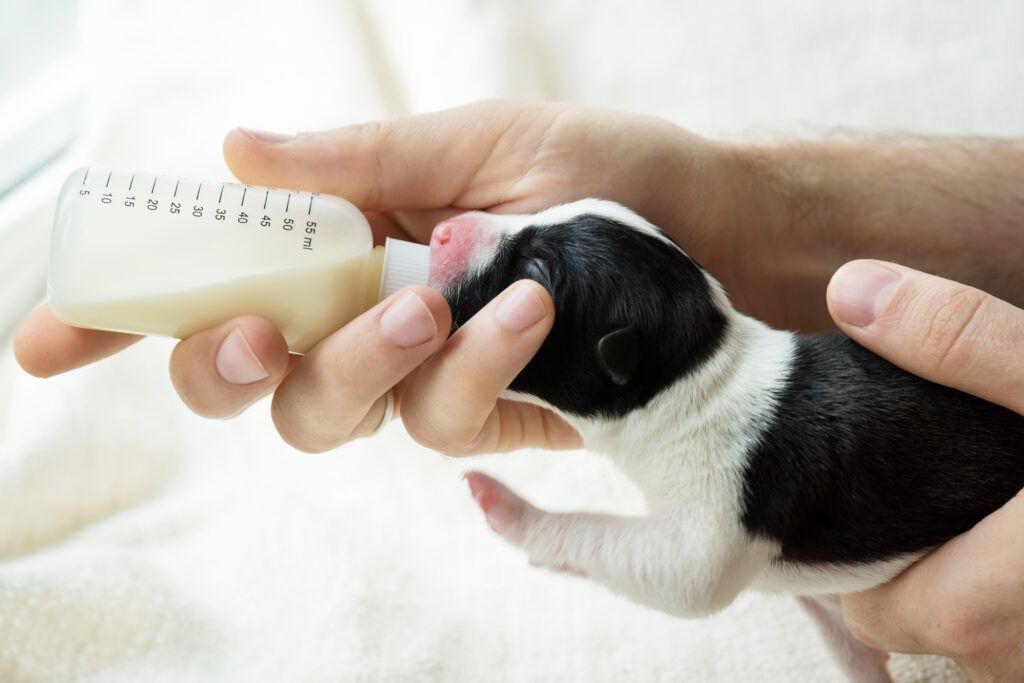How To Take Care Of A Newborn Puppy? Owning a puppy is a wonderful experience. However, puppies are just as vulnerable during their first months of life as human children and require care and attention to ensure they grow up healthy and strong.
One essential thing you must do when caring for a newborn puppy is to keep them clean. Without proper care, your puppy will be exposed to infection and disease, which can be fatal.
By taking good care of your puppy born in the home, you will guarantee a healthy and happy life. Read on – How To Take Care Of A Newborn Puppy?
Things to take note of when handling a newborn puppy:
i. Proper Feeding Your Newborn
A puppy should be fed only twice a day. This can be done by mixing the puppy’s food with a bit of warm water, which will give it the consistency of a weak soup.
If you mix the puppy’s food too much, then you will be feeding them too frequently, which could put your puppy at risk for obesity. You should never lie down or sleep with your dog when they are eating; this is a serious cause of potentially fatal choking.
ii. Grooming the Puppy
You should brush your puppy after each meal. This will help remove any loose dander, dirt, and dust from their skin and coat.
You should also regularly be massaging your puppy’s skin, which helps loosen dead hair before it is shed. This is important because the puppy’s coat will trap loose hair, which can lead to clogging of the respiratory system.
iii. Keeping Your Puppy Warm
During the cold days, you can try belly heat; this will keep your puppy warm and cozy. You can also create a warming blanket or pad for your puppy that is large enough to cover most of the body.
You can also use a heating pad in addition, which works by emitting infrared energy that facilitates heat accumulation in the body. You can even use an electric blanket for puppies at bedtime or for warmth during their illness.
iv. Keeping Your Puppy From Becoming Overly Excited
Your puppy may be so full of energy in the first few weeks of life. However, you must still make it a point to avoid overly exciting them.
You should avoid tossing and throwing toys near them as this can cause excessive movement that can make your puppy sick. Another thing is to never let them run and jump in excess because it can stress the joints and lead to arthritis later on.
vi. Treating Your Puppy’s Illness
You should always consult your veterinarian whenever your puppy gets ill or is infected with an illness. Your veterinarian will prescribe the proper medication and give you advice on how to ensure your puppy can recover from illness.
iii. Playing With Your Puppy
Once your puppy is approximately three months old, you could start to play with them using ball throwers and toys that involve rolling, fetching, and playing hide-&-seek. These kinds of toys will help your puppy grow into a mentally healthy adult dog that can socialize well with other pets and humans.
What Can I Feed The Puppy For the First Week?
In the first week of your puppy’s life, you should provide them with a diet that is consistent and easy to digest. You should not give them any solid food or they may suffer from digestive problems.
Instead, you should feed them a high-quality milk replacer that uses only natural ingredients. This is because puppies younger than seven weeks old don’t have the right stomach acid to digest other food.
Deficiency in calcium and vitamin D can lead to bone abnormalities and deformities such as rickets.
You should give them approximately 1/4 cup of milk replacer per puppy, which is equivalent to a few drops from an eyedropper. By doing this, you will be able to provide your puppies with the nutrients and vitamins they need for their growth.
Does A Newborn Puppy Need To Visit A Vet In Singapore?
In Singapore, the law requires dogs to be vaccinated against common dog-related sicknesses, such as distemper, hepatitis, and rabies. However, since your puppy is just born, they are not legally required to be vaccinated right away.
You can personally decide when to start vaccinating your puppy. You should begin the vaccination process once they reach four months old; this will provide them with protection against many dog-related illnesses.
In case of any illness, you are required to get your puppy to a veterinary clinic or hospital for treatment as soon as possible. It is also advised for dogs to be vaccinated against rabies at least once every three years.
Common Illness And Problems Of a Newborn Puppy
When it comes to your new puppy’s first health issues, you should have a general idea of what to look out for. Your veterinarian will be able to tell you if your puppy needs to see a vet and what the best treatment options are to restore health, reduce discomfort, or both.
i. Congestion
If a puppy has a red patch on its throat, then this is likely the result of congestion or an overactive respiratory system. It is because your puppy’s respiratory system isn’t fully developed yet.
It is important to determine why they’re experiencing congestion, so you can treat it at an early stage. You should adjust their feeding schedule to accommodate for the change in the airway, which will allow them to breathe more comfortably.
ii. Diarrhea
If your puppy is suffering from diarrhea or loose stool, then you should start by switching their diet to something gentler on the digestive system. You could also try adding more fiber or feeding your puppy with canned pumpkins.
This will aid in better digestion and help to regulate the digestive system. An alternative treatment that you can use is fluid therapy; you can mix sweetened condensed milk with water for easier drinking.
iii. Constipation
If your puppy is experiencing constipation, then you need to increase the amount of water that they consume; this will help with the passage of stool.
You can also try giving them a fiber supplement such as Metamucil or Coloxyl, which are both available in tablet form. This will help them to increase their consumption of water and move their stool from constipation.
How To Take Care Of A Newborn Puppy? – Conclusion
A newborn puppy is a source of joy and happiness for all during the first few weeks of their lives. These first few days will go by so quickly, but you should use them to begin to build good habits that will last your entire life.
Your puppy’s health and well-being should always be your number one priority, because if they’re healthy and happy then you can be too.



